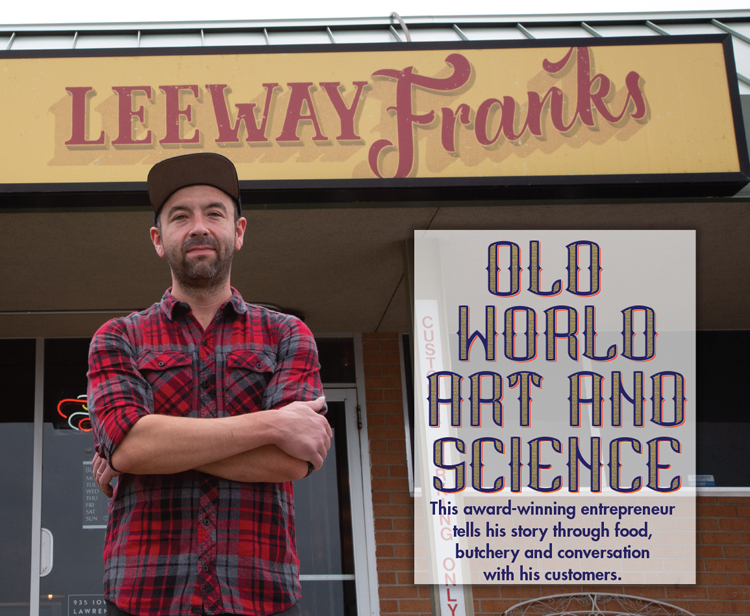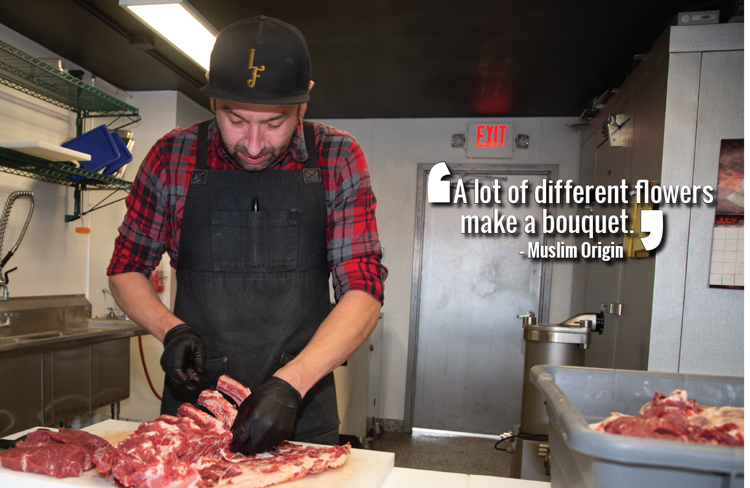This award-winning entrepreneur tells his story through food, butchery and conversation with his customers.
| 2019 Q3 | story by Joshua Falleaf | photos by Steven Hertzog

Lee Meisel, owner of Leeway Franks and Leeway Butchers
Old-world skill and new school flair blend just off of Ninth and Iowa streets at the Hillcrest Shopping Center. With just a knife and cleaver, as well as active Facebook and Twitter accounts, Leeway Franks intends to provide customers “nostalgic food memories” that inspire a “childlike joy,” explains owner, butcher, chef and raconteur Lee Meisel. He is nothing if not passionate about the detailed process of serving a good meal, especially a good frankfurter.
The art of butchery was learned very early. As a teen, Meisel processed thousands of deer during deer season in Mandan, North Dakota, just north of his childhood home on Standing Rock Reservation. He “learn[ed]how to grind meat properly, break down the animals and then mixing in pork to get the fat-to-lean ratio just right.” These were just a few of the lessons that comprised the “crash course” that would stick with him into adulthood and propel him into opening his own business.
Meisel remembers the relationships his Lakota people had with the cattle and crops that surrounded them, and with whom they shared the earth. The indigenous way, he says, is to understand and celebrate food and the community coming together to eat and connect. “[People] canned beets. They made sausages and raised animals obviously for food” to feed their families.
After several false starts at pursuing a college degree, Meisel came to Lawrence in 2005 to study business at Haskell Indian Nations University, home to Native American students from approximately 150 distinct federally recognized tribes from across the United States. “The most eye-opening thing,” he says, “was the realization of how diverse Indian Country is. I never knew how many cultures and languages … It really teaches you about other people, but it really teaches you about yourself. How do you represent yourself, your tribe and your community?” This idea is what sparks his own creativity and determination to find the best local products and prepare them in the ways he learned growing up.
Finding an academic home at Haskell and meeting his wife and business partner, K, he continued to work in Kansas City and Lawrence in the food industry. At the Merc and 715, as well as in KC, he continued to hone his skills as a butcher, develop recipes and learn through experience what the instructors at Haskell were teaching him about business.
Upon his arrival in Lawrence, Meisel recognized that the local food system and the produce he now had access to was astounding. “I couldn’t believe the produce,” he says, “Tomatoes and heirloom varieties of tomatoes I never heard of. I thought tomatoes were either big or little.”
Meisel says Lawrence and the surrounding communities are “effortlessly charming” and make available some of the best produce and livestock he’s found in his decades-long culinary career. In just a short drive, he’s able to access delicious seasonal produce and meats of many varieties. Moreover, this community appreciates a love of farming and does “very little [to the products]but treat it with respect.”
Local sourcing of produce and meat, and even a local bakery where he gets his bread fulfills Meisel’s sense of community and relationships. “We want to get back to knowing the people who [care for]the eggs, food, meat” that they provide. This is Meisel’s way. “I buy lambs and goats from kids at the 4-H auctions or the fairs,” he explains, wherever he can get the best.
Once the product comes to Leeway Franks, there is no less care for it amongst the team. Recipes are simple, clean and respectful. “My seasonings are salt, pepper, brown sugar, things that make it taste good,” he says. More clearly, the seasonings simply help the ingredients taste more like themselves. As for what he plans to serve with each menu, “I really let the ingredients dictate what we’re going to do.”
Having worked in many upscale restaurants with amuse-bouche, many pretty plates and extensive wine lists, he decided to chart his own path and create his own business: an “upscale concession stand” he calls it. “I wanted the ability to tell my own story. I worked at places that were like, ‘Look at how complicated things can get.’ And I wanted something simpler.”
Meisel fondly remembers those moments, those flavors that have stuck with him long after digestion. “My favorite food memories,” he says, “are like, this truck stop that had the best soup. Or this concession stand that cut their own fries and served them with vinegar.”
These are the kind of thoughts and emotions Meisel and his team seek to create with simple, familiar fare done in just the right way with the best local ingredients. Each item that appears on a menu is made as many times as necessary to make that experience happen. He explains that some items haven’t yet been available because they don’t “eat well.” In other words, the action of eating is perhaps messy, with ingredients sliding out of the side or back when one takes a bite. It will make an appearance when those issues are resolved.
In 2015, Leeway Franks opened its doors. It was and is still a “low-budget DIY” establishment. Meisel understands that in business, what you get out of the venture is “almost absolutely proportional to the amount of effort you put into it.” And he and wife, K Meisel, and his entire team put in tons of effort.
Just four years following the first bratwurst served at Leeway Franks, Meisel opened Leeway Butcher, just two storefronts from Franks. Not only can he now provide sausages and meats for his restaurant with more space to work with raw local products, he also employs “old-world style” butchery to make various cuts available to customers wanting to cook and grill at home.
Meisel’s “old-world style” butchery has several unique elements. In “a retail cutting environment, everything is portion controlled,” he says. “You get beef that’s already broken down into primals and subprimals.” He’s done this throughout his journey, creating the familiar cuts of meat found in the average grocery store and other markets.

Lee Meisel demonstrates the art of butchering
At Leeway Butcher, “We isolate more of the muscles and seam cut them. We call it seaming,” he says. “And so we really focus on those individual cuts because we can merchandise them in different ways.” While commercial butchery has familiarity and dollars in mind, Meisel approaches butchery from a “value-added” perspective for the consumer, with cuts not as common in the American commercial market, where “a lot of those muscles would be attached to other muscle groups.”
Another quality Meisel brings with his “old-world style” is not “run[ning]stuff through a band saw like a big packing facility, where you would sit in one spot all day and do one movement.” He and his staff “mostly use a knife and a cleaver,” he says. It is both art and science. It entails an understanding of the anatomy of the animal, the structure unique to each, as well as the art of communicating to customers appropriate home-preparation methods.
“How do we make the guests happy with finding things they’re familiar with?” he posits. “And if there is something outside of their comfort zone, how do we teach them and start that conversation about how to cook things properly?” He understands that “it’s not the easiest conversation to have,” but he continues to be passionate about “relat[ing]to people on a personal level.”
This has been his calling card. Lee Meisel is telling his own story through food, butchery and regular conversation with folks who come in. He also realizes others are telling theirs, and he’s incredibly interested in them.
The winner of many local and national awards for his food and business, Meisel was named 2019 Top 50 Native Business Entrepreneurs by Native Business Magazine.Rather than celebrate himself or his success, he is “more fascinated with opening up that article and seeing 50 people opening their own businesses and doing things in Indian Country and beyond. It just blows my mind,” he says.
Embodied in Leeway Franks and Butcher is Lee’s desire to connect and share with others. Although he’d “love to have Leeway Franks in grocery stores across the country,” he’s equally as adamant about connecting his home in North Dakota with his home in Lawrence by bringing “bison from my Tribe to Kansas,” he explains.
“Even though I’m not on the reservation anymore,” Meisel continues, “I feel like I’m able to represent my tribe in a positive manner. Maybe there’s somebody out there who’s like, ‘Why can’t I do that? That’s incredible.’ ” p
